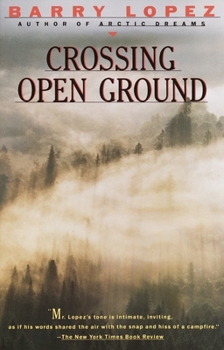Crossing Open Ground
Select Format
Select Condition 
Book Overview
In Crossing Open Ground, Barry Lopez weaves the same invigorating spell as in his National Book Award-winning classic Arctic Dreams. Here, he travels through the American Southwest and Alaska, discussing endangered wildlife and forgotten cultures. Through his crystalline vision, Lopez urges us toward a new attitude, a re-enchantment with the world that is vital to our sense of place, our well-being . . . our very survival.
Format:Paperback
Language:English
ISBN:0679721835
ISBN13:9780679721833
Release Date:May 1989
Publisher:Vintage
Length:224 Pages
Weight:0.55 lbs.
Dimensions:0.6" x 5.2" x 8.1"
Customer Reviews
5 ratings
Giving authors their due
Published by Thriftbooks.com User , 19 years ago
This wonderful book's authorized publisher in the US is only Charles Scribner's Sons--not Peter Smith. What's the story with this?
The Eyes of Wonder
Published by Thriftbooks.com User , 20 years ago
This collection of essays is glorious and sad. The writing lets the reader see what Barry Lopez is seeing with so few precise words. The gifts of wilderness are felt while reading sentences like, "You could feel the creek vibrating in the silt and sand.". The saddness comes from knowing these essays were written in the 1980's and so much more has been destroyed since then.Due to when this book was written, there are a couple of references to former President Reagan's "environmental record" written in real time.There were so many essays that I loved, including the one speaking of traveling the river with Paul Winter. I am going to quote a passage from "Children in the Woods"."The quickest door to open in the woods for a child is the one that leads to the smallest room, by knowing the name each thing is called. The door that leads to the cathedral is marked by a hesitancy to speak at all, rather to encourage by example a sharpness of the senses. If one speaks it should only be to say, as well as one can, how wonderfully all this fits together, to indicate what a long, fierce peace can derive from this knowledge."
At the edge of the senses.
Published by Thriftbooks.com User , 23 years ago
"I live in a rain forest in western Oregon, on the banks of a mountain river in relatively undisturbed country, surrounded by 150-foot-tall Douglas firs, delicate deer-head orchids, and clearings where wild berries grow" (p. 148), Barry Lopez writes in this collection of his 1978 to 1986 essays. Lopez allows each essay to tell a story leaving its reader with "an inexplicable renewal of enthusiasm." "It does not matter greatly what the subject is," he writes about storytelling, "as long as the context is intimate and the story is told for its own sake" (p. 63). Subjects of these essays include a stone horse intaglio, white geese at Tule Lake, boating the Colorado River with jazz musician, Paul Winter, bull riders, beached whales, searching for Anasazi remains, and "the passing wisdom of birds."Readers will cross open ground in these essays and enter the natural world, becoming immersed in its much larger meanings. "Wildlands preserve complex biological relationships that we are only dimly, or sometimes not at all, aware of" (p. 80). These essays are rich in wilderness wisdom, enough wisdom to please any fan of Ed Abbey or Wendell Berry. "We grasp what is beautiful in a flight of snow geese rising against an overcast sky as easily as we grasp the beauty of a cello suite," Lopez writes; "and intuit, I believe, that if we allow these things to be destroyed or degraded for economic reasons we will become deeply and strangely impoverished" (p. 38). He quietly observes, "wilderness can revitalize someone who has spent too long in the highly manipulative, perversely efficient atmosphere of modern life" (p. 82).Whether I'm reading his stories or essays, Barry Lopez is among my favorite writers. He will bring you to the edge of your senses: "Everything found at the edge of one's senses--the high note of the winter wren, the thick perfume of propolis that drifts downwind from spring willows, the brightness of woodchips scattered by beaver . . .all this fits together" (pp. 149-50).G. Merritt
Door to a cathedral of nature
Published by Thriftbooks.com User , 23 years ago
Lopez is concerned with our collective understanding of nature. From studying a 3000-year-old horse intaglio to looking for Anasazi granaries he seeks our ancestral relationships. The essays work best when he mixes his reflection with keen observations. Where the essays have a heavier philosophical hand they aren't as effective. As he says "The door that leads to the cathedral is marked by a hesitancy to speak at all, rather to encourage by example, a sharpness of the senses". Lopez 's narratives sharpen many senses from the sudden assault of the sound of snow geese to "two snails small as pinheads chewing a leaf". There are reflections on the role of biologists, from communicating between scientists and shipmates in the arctic to their role in a whale stranding. Perhaps he thinks biologists have greater insight, but he also understands the need for mystery and direct experience. For Paul Winter fans there is a description of the raft down the Grand Canyon that produced the album "Canyon". As a current update, the snow geese written about in one essay are continuing to boom and damage their arctic breeding grounds.
Food for the soul
Published by Thriftbooks.com User , 26 years ago
Excellent reading for those connected with the Earth. Food for the soul. One of the best gifts I have ever recieved.






